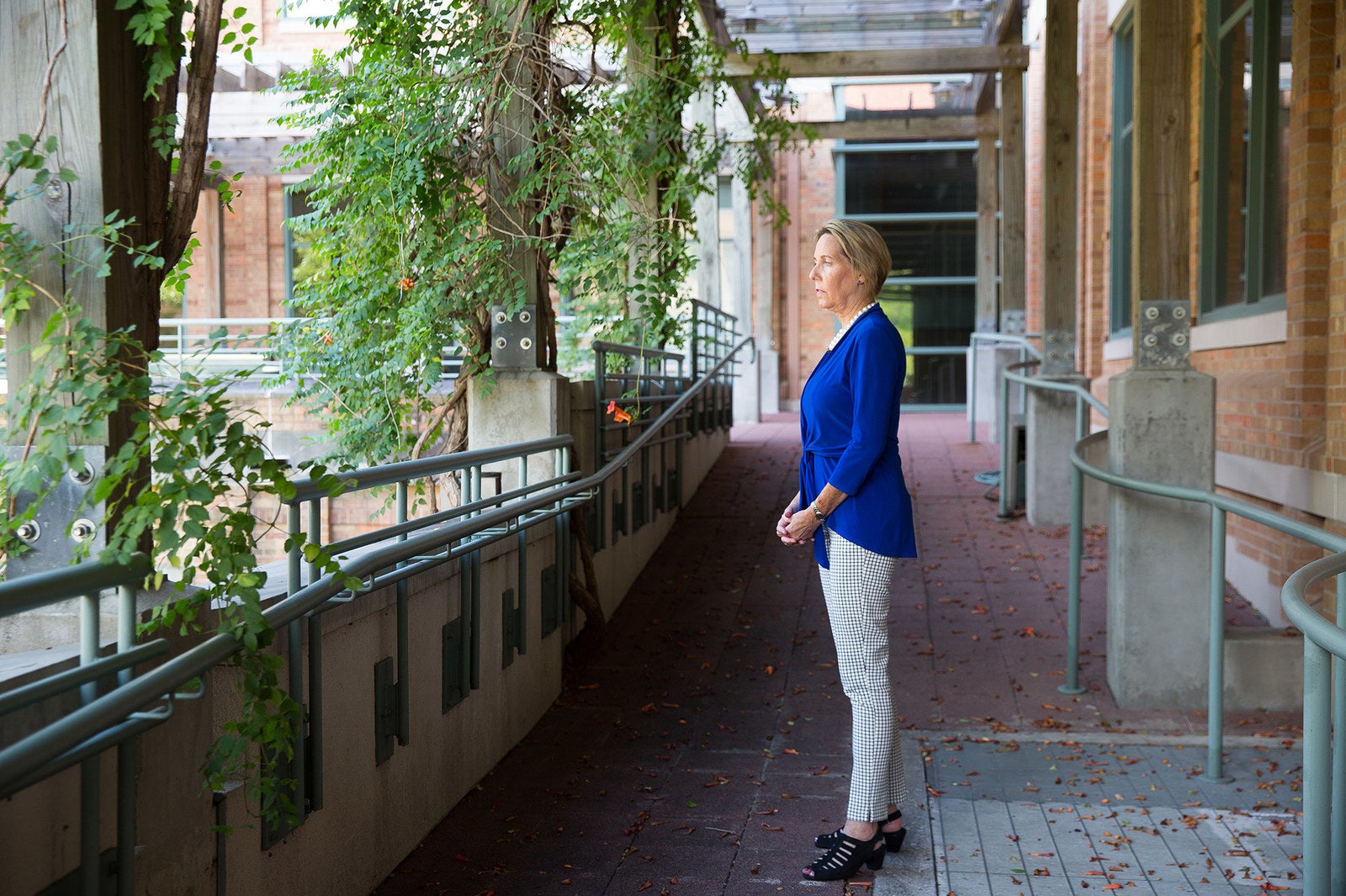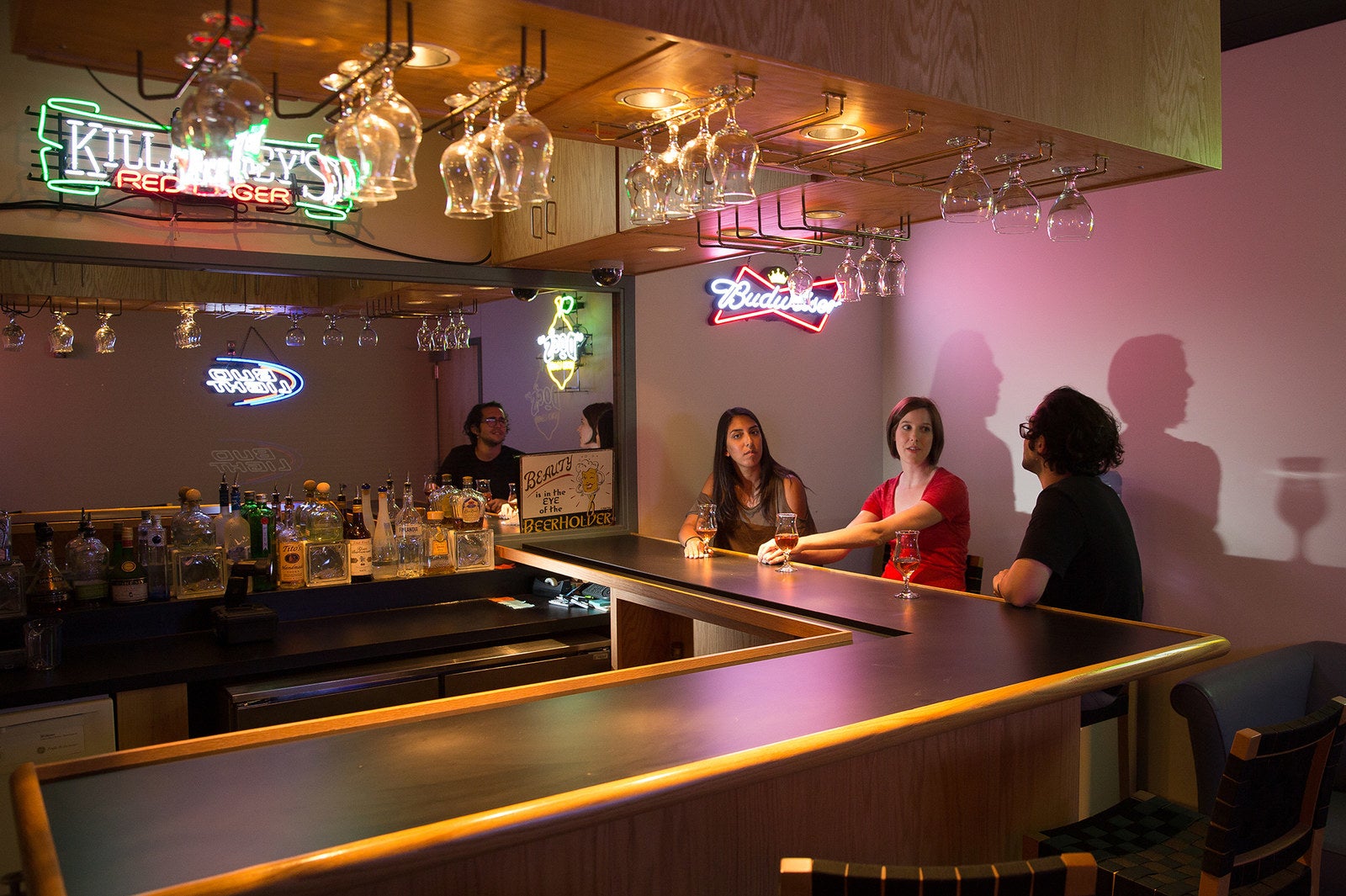One afternoon in March 2016, Kim Fromme took the stand in a Santa Clara, California, courtroom as an expert witness in the now-infamous case of the People v. Brock Allen Turner. The jury was tasked with determining what had happened between Turner, a former Stanford University swimmer, and “Emily Doe,” a 22-year-old woman who had no memory of Turner, a stranger, sexually assaulting her after a frat party.
In California, it’s illegal to sexually penetrate someone who you know is incapable of consenting, and the prosecution sought to prove Turner took advantage of an incapacitated, vulnerable woman. The defense, arguing that Doe had consented before she fell unconscious, hoped to tell the story of a drunken college hookup. To do so, they needed Fromme.
Fromme, a clinical psychology professor at the University of Texas at Austin, has testified in, consulted on, or provided depositions for more than 50 criminal, civil, and military cases since 2009, the majority of which have involved men accused of sexually assaulting drunk women. In all but a handful of those cases, she has worked on behalf of the accused, whose lawyers hire her to explain how research shows it’s possible to engage in voluntary activities during an alcohol-induced blackout. More specifically, Fromme will say that a woman can voluntarily have sex while blacked out, even if she can’t remember doing so.

Fromme has studied the effects of alcohol intoxication and associated risk-taking for three decades, and she sees herself as an unbiased educator who believes everyone has the right to a fair trial, including alleged rapists. But critics say Fromme is a hired gun — “the paid angel of death of sexual assault,” one called her — who profits off advancing the stereotype that drunk women “cry rape” after sobering up.
“Do you believe that you have a vested interest in this case, or are you here just to educate the jury?” prosecutor Alaleh Kianerci asked Fromme in a heated cross-examination that March afternoon.
“That's a very good question,” said Fromme, who wears her blonde hair cut short and has the calm, contemplative nature of someone more used to lab work than courtroom drama.
“I think that I do have an interest in this case,” Fromme said. “I do not think my testimony is biased by that. The facts are the facts.”
Although it's estimated that half of all sexual assaults involve alcohol, it used to be that women who were raped while drunk rarely, if ever, reported it to police. Who would believe them? Times have changed, thanks to rape-law reform, digital evidence — photos and texts help fill in the blanks when memory fails — and a major cultural shift, vigorously promoted by the Obama administration, that assures victims that sexual assault is never their fault.
A generation ago, Brock Turner probably wouldn’t have faced any charges. In 2016, his guilty verdict wasn’t enough to satisfy those fed up with the status quo: Instead, there was national outrage after Judge Aaron Persky gave Turner a light sentence, in part because alcohol was involved.
“Alcohol was not the one who stripped me, fingered me, had my head dragging against the ground, with me almost fully naked,” Emily Doe wrote in a victim’s statement that went viral. “Regretting drinking is not the same as regretting sexual assault.”
But while researchers say suspects shouldn’t use alcoholic blackouts as a defense for committing crimes, the jury is still out, so to speak, on whether alleged victims of sexual assault should ever be held accountable for drinking too much.
For many anti-rape advocates, the answer is unequivocally no. "If a young woman is drunk, SHE CANNOT CONSENT," former vice president Joe Biden, who spearheaded the bystander-intervention campaign “It’s On Us,” recently told Teen Vogue. "She cannot consent, and it's rape. It's rape. It's rape. It's rape."
In courtrooms, and on college campuses and military bases, the line between drunk sex and sexual assault is murkier. Even reality television is divided over whether it’s possible to give consent while intoxicated: In June, the wildly popular show, Bachelor in Paradise, dominated headlines after a producer suspected a contestant was too drunk to consent to on-camera sexual activity.
Few people understand what it truly means to be in a blackout, Fromme said.
One central point of confusion is that few people understand what it truly means to be in a blackout, Fromme said, despite the rise of “extreme” binge drinking in recent years. When attorneys want to convince juries and judges that drunk sex and rape aren’t synonymous, they call her up. In 2013, she testified for the defense in the landmark Steubenville, Ohio, high school football rape case, in which two teenage football players were charged with and found guilty of sexually assaulting an intoxicated 16-year-old girl. Fromme’s testimony helped set military-law precedent in a monumental case which ultimately determined that just because a member of the armed forces is intoxicated doesn't mean they are unable to consent.
On the stand, Fromme will define the difference between “passing out,” or losing consciousness, and “blacking out,” in which your brain only loses the ability to transfer information from short-term to long-term memory. She will explain that there are two different types of blackouts — “fragmentary,” in which you can recall certain events if prompted, and permanent “en bloc” blackouts — and that even if someone shows clear signs of intoxication, such as slurred speech, it doesn’t mean they’re unable to engage in voluntary actions. She will say it’s as impossible to tell if someone is experiencing a blackout as it is to tell if someone has a headache, because it’s happening inside that person’s brain, invisible to others.
Most crucially for her clients, Fromme will explain that it’s reasonable to assume someone in an alcohol-induced blackout knows what they’re doing at the time they are doing it, since their cognitive functions remain intact. People in blackouts can still actively engage with and respond to their environment in a variety of ways, research shows, whether they’re selecting what to order off the McDonald’s late-night menu, buying sneakers off eBay, or having sex. They just don’t remember any of it.
Fromme insists her testimony doesn’t change regardless of whether she’s retained by the defense or the prosecution. Of course, sex crimes prosecutors rarely want her on their side. Why would they imply an alleged rape victim may have consented to an act she can’t remember?
“Sometimes, honestly,” Fromme said, “I think they call me so that the defense can’t.”

It took a year to convince Fromme to meet with me. She was wary given the blowback she received after Brock Turner’s case, she said.
“To my surprise, feminist colleagues and friends for over 30 years have now shunned me at national conferences and criticized me for ‘helping rapists,’” she emailed last October. “I continue to receive ‘burn in hell, bitch’ emails from the general public.”
We finally met in June for happy hour on a shaded Austin patio, where we drank pomegranate-cucumber martinis and shared what can only be described as “drunk food”: bacon cheeseburger sliders, chips and queso, and beer-battered fish tacos.
In court, Fromme often uses real-life examples to make the complex science intelligible. She once described the concept of fragmentary blackouts to a jury by describing what it feels like when your friends tell you how you embarrassed yourself the night before: “They say, ‘Remember, you know, we went to that karaoke bar? Oooh, and you did that Tina Turner song up on the table.’ And you go, ‘Yeah. Now, I remember that.’” While testifying in Turner’s case, Fromme told a story about a man who made plans for an upcoming wedding anniversary while in a blackout.
“I continue to receive ‘burn in hell, bitch’ emails from the general public.”
“So he decides to go on Travelocity, figure out a travel destination, evaluate hotels and rates and different places he could go, makes the decision to where he's going to go, which hotel, which flights, books it, goes to bed, wakes his wife, tells his wife about it, they have celebratory sex about this trip they're going on for their anniversary, goes to sleep,” Fromme told the court. The next morning, “the wife is in a really cheerful mood,” Fromme said. “He doesn't know why until he goes to his computer and sees the trip that he booked.”
Fromme likewise saw a learning opportunity in our pink cocktails. Her research shows some people black out at blood alcohol content levels as low as 0.07, which is below the legal limit to drive, but most start losing their memory at BAC levels of 0.2 and above. Instead of blindly downing drinks, Fromme said, people should know their own limits and act accordingly. For example, it’s estimated that a 135-pound woman could reach a 0.2 BAC level by drinking eight 12-ounce beers, 5-ounce glasses of wine, or 1.5-ounce liquor shots over a period of four hours — and research shows she’d be much more likely to black out if she chose the shots.
“I made the decision that I could have these two drinks, and I know what my BAC will be and what my tolerance level is, and I will be absolutely fine to drive home,” Fromme said. “I am responsible for that.” She asked me to imagine what would happen if we got “shitfaced” together and I decided to get behind the wheel. No judge would let me off the hook if I got caught, she pointed out, yet our legal system allows people to allege rape if they have sex but can’t remember consenting to it.
"Boy, is that interesting,” Fromme said. “You could not say, 'I was so drunk I couldn't make the decision to drive.’ They’d go, ‘lock her up!’ But with sex, you can.”
Fromme grew up in Elgin, a small “dry” town outside of Austin where “the mentality was if we don’t sell alcohol, the kids won’t drink,” she said. “You know how well prohibition worked.” More than a few friends were killed in drunk-driving accidents, which sparked Fromme’s interest in understanding, and preventing, the negative consequences of alcohol abuse.
Although prosecutors have tried to tear apart Fromme’s credibility in courtrooms, she is highly respected among other alcohol experts. In addition to publishing over 100 peer-reviewed studies in top-tier scientific journals, Fromme has served on high-profile research boards, received millions of dollars in funding from government agencies, and was one of seven scientists in the country picked to serve as advisory counsel to the National Institutes of Health. She’s taught at UT Austin for 24 years, where she runs a barroom simulation laboratory that looks exactly like a dive joint, complete with dim lighting and neon bar signs.
There, Fromme and her graduate students dose study participants with vodka cocktails and run tests on their decision-making skills — during my visit, I tried out a gambling computer game that evaluated my impulsiveness (Fromme said it would be improper to serve me alcohol in the lab, so I took it sober). In the 1960s and '70s, researchers actually induced blackouts in participants, but that’s no longer considered ethically acceptable. The bar lab usually cuts participants off at the level of legal intoxication, 0.08 to 0.12.
“I am embarrassed to be a colleague of Kim Fromme's. Clinical psychologists should not be #rapeapologists.”
“We’re never going to offer people the opportunity to have drunk sex in the lab,” Fromme said, somewhat wistfully.
Fromme and other researchers in the relatively small field now rely primarily on self-reported data to study blackouts. They know that only about 50% of drinkers have experienced blackouts, and that women are more susceptible to them, since they metabolize alcohol differently than men. But they don’t know why some people will never black out at all, although Fromme is currently researching whether genetics play a role. For the past 10 years, Fromme has been tracking a pool of over 2,000 young adults to examine changes in their alcohol use over time. For example, she once conducted a thorough survey of their 21st birthdays: Participants came in after partying to discuss what they drank, how drunk they got, who they were with, and what they did. A number of them, Fromme said, found out after the fact that they’d had sex.
The University of Texas has been “extraordinarily supportive” of Fromme’s expert-witness work, she said, which she typically only schedules over semester breaks, although not everyone there is a fan. “I am embarrassed to be a colleague of Kim Fromme's,” one UT English professor tweeted after the Steubenville trial. “Clinical psychologists should not be #rapeapologists.” Fromme said one peer and longtime friend cut her off after the Stanford trial.
“She said, ‘Just by virtue of testifying, you are condoning sexual assault,’” Fromme said. “She said, ‘You’re just like the Nazi who put the people on the train and said they didn’t know where they were going.’”

Fromme first served as an expert witness in 2009, as part of the defense team in a Fort Hood military case. In recent years, there has been increased scrutiny over how the military handles sexual assault, and it wasn’t long before more cases came Fromme’s way — from a high-profile case against three Naval Academy football players to a 2013 case that clarified the definition of “consent” for the first time in military court.
In that case, a navy technician named Jacob Pease was sentenced to six years in prison for sexually assaulting two subordinate female sailors on separate occasions, both of whom were drunk at the time. The verdict was overturned and upheld by the military’s highest court of appeals in what military attorney Joseph Jordan called a “landmark” decision. The big takeaway was that just because a member of the armed forces is intoxicated doesn't mean they have the inability to consent, and since it was based in part on Fromme’s testimony, she became “a big deal in the military world,” Jordan said.
But in criminal court, there’s no singular legal definition for consent. It’s up to states to define what it means to consent to sex, as well as what it means to be intoxicated and whether it matters if you voluntarily drink yourself into an incapacitated state. When Fromme testifies about “voluntary actions,” she’s speaking generally, not legally. Since “we can’t get inside somebody’s brain,” Fromme won’t testify as to whether an alleged victim had the cognitive ability to give consent at the time in question — just that her blackout state doesn’t “necessarily mean” she was unable to consent. It’s up to the defense attorney to speculate from there.
Although the cases Fromme works on often have many similarities, results vary from case to case and state to state. In recent years, Fromme has helped win acquittals for a Florida man who was charged with sexually assaulting a college student after a witness saw him performing a sex act on her outside, and a pair of mixed-martial-arts students accused of raping an underage peer in Washington, DC.
The Stanford case wasn’t as successful. Turner was convicted of three felony counts, and Fromme’s credibility was attacked on the stand. Prosecutor Alaleh Kianerci didn’t challenge the scientific basis of Fromme’s expertise when she had a chance to in a pretrial hearing (although she did succeed in striking portions of Fromme’s report). But in front of the jury, Kianerci questioned Fromme’s motivations.
First, Kianerci attacked Fromme for charging around $10,000 per trial (which sounds pricey, but Fromme’s fees — which she says vary widely — are on par with average expert-witness rates). Then, Kianerci showed the court emails Fromme sent Turner’s defense attorney: one in which Fromme referenced a “huge acquittal” in a recent alcohol-related rape case she had worked on, and another in which said she hoped for a “comparable outcome for our client.” In another email, Fromme wrote that sharing information from a prior case would be “akin to showing our entire poker hand in advance of placing our bets.”
“Do you think this is a game, Dr. Fromme?” Kianerci asked.
“I do not,” Fromme said. “It’s very serious.”
“It is,” Kianerci said. “And you're sitting there as an expert witness telling the jurors that you're unbiased. But there's all this evidence, based on your own statements, about your interest in the outcome of this case and your attempts to influence the jury. Is your opinion being influenced by the fact that you're getting paid $10,000 and are trying to help the defendant?”
It’s impossible for expert witnesses who are hired by legal teams to be truly independent. Still, Fromme insists she’s as impartial as possible. “I don’t feel like I’ve become the advocate of those accused,” she said. She believes “violent rapists” should be “severely punished,” and has turned down cases — for example, she won’t testify on behalf of alleged rapists who use a blackout state as their defense.
But Fromme often sides with the defense even after the trial is over. In emails, she described a recent guilty verdict in a military sexual-assault trial as “heartbreaking.” She once forwarded me a letter she felt was "positive" regarding the Stanford case, which made the (baseless) claim Turner was "railroaded": “That girl had a boyfriend and that is fueling everything.” And Fromme stands by the email Kianerci referenced during the Stanford trial in which Fromme said she hoped Turner would be acquitted.
“I thought it would be awful, frankly, for a kid that age to have his life ruined,” Fromme said, “which it has been.”
“You can’t say just because somebody can’t remember what they did, they weren’t acting intentionally and voluntarily at the time.”
After the Stanford case, Fromme said she agonized over whether her “ethical responsibility to educate” the public about blackouts was worth alienating friends and colleagues. Prevention has always been Fromme’s stated goal — early in her career, she helped develop one of the first programs in the country designed to teach students how to drink responsibly, rather than simply abstain — which is one reason why she continues to take on expert-witness work, she said, even though she sees herself as a professor and mentor first. If more people understand the science behind why blackouts happen and who is at risk, Fromme’s thinking goes, they can make more informed decisions about their alcohol use. But what if no one wants to listen?
Last month, Candice Jackson, the new acting assistant secretary for civil rights at the US Department of Education, said 90% of campus sexual-assault allegations are really consensual drunken hookups.
They “fall into the category of ‘we were both drunk,’ ‘we broke up, and six months later I found myself under a Title IX investigation because she just decided that our last sleeping together was not quite right,'" Jackson said.
Jackson later apologized for being “flippant,” but her unfounded claims were all too familiar. Cultural inroads aside, rape allegations still aren’t taken as seriously when alcohol is involved, and it’s still only women who are told to drink less to reduce risk. It’s no wonder anti-rape advocates would rather urge men to be more aware than endlessly debate the line between drunk sex and rape. Fromme’s critics don’t typically question her research. They question whether, given the legal system’s history of supporting accused rapists over their accusers, it’s ethical to use those findings to discredit alleged victims.
For Fromme, the facts are the facts, regardless of whose story they support — or who’s paying her to help defend them. Like it or not, “you can’t say just because somebody can’t remember what they did, they weren’t acting intentionally and voluntarily at the time,” Fromme said over our pink cocktails.
“It can be difficult for people to wrap their brain around,” she said. “People love black and white. Unfortunately, life isn’t that tidy, is it?” ●
Outside Your Bubble is a BuzzFeed News effort to bring you a diversity of thought and opinion from around the internet. If you don't see your viewpoint represented, contact the curator at bubble@buzzfeed.com. Click here for more on Outside Your Bubble.

